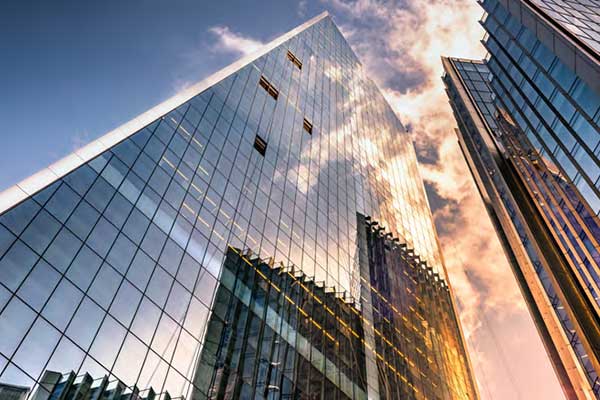The manufacturing sector is a large part of the economy and decarbonisation will be a major undertaking. Manufacturing has been characterised as a significant source of carbon emissions as it uses a lot of energy and relies on fossil-fuel-burning transportation. The use of technology, particularly digital technology, could help the sector on its journey to net-zero.
To start the webinar, Robert Hall, Executive Director of Resilience First, set the scene and introduced the chair, Sahar Ehsani, Senior Segment Marketing Manager – Discrete Manufacturing at Intel. Sahar spoke about Intel’s commitments to sustainability and how technological advances over the last decade for consumers are now being mirrored by changes in the manufacturing sector. This means more computing power is needed but without creating more emissions – ‘More Energy, Less Carbon’. Technology can help in achieving this. Of the 169 UN Sustainable Development goals, 103 are directly influenced by digital technology.
Sahar then introduced the keynote speaker, Stephen Phipson CBE, CEO of Make UK, an organisation that represents manufacturers. Make UK’s members employ one million of the people who work in manufacturing in the UK.
The challenges for manufacturing
Manufacturing is vital to our economy and is becoming increasingly green. It represents 53% of the UK’s exports, 10% of GDP and accounts for 65% of research and development funding. There is no denying though that it is a major carbon emitter, making up 12% of UK emissions. The sector is diverse, and includes some very energy intensive industries where energy accounts for 20% of their overall costs. Other industries still consume a good deal of energy through the use of things like rollers, boilers and machine tools.
One major cause of energy waste is old, leaky equipment. In addition, old equipment does not have any provision for reusing any heat generated, so it is wasted rather than being recycled. In the UK we have tended to ‘sweat’ existing equipment rather than invest in new technologies.
Manufacturing will always require energy to obtain raw materials, produce goods and, finally, transport products to the consumer. It is not really a question of whether transportation is needed or not. It’s more the type of fuels and transport mechanisms that are needed. There are difficult problems to face: while shipping makes up only 3% of transportation emissions, it is very hard to decarbonise.
Meeting the challenge of Net-Zero
Make UK is watching with interest initiatives like the ‘Clean Maritime Demonstration Competition’ and the ‘Jet-Zero Council’ which are about decarbonising shipping and air travel. Manufacturing is also agile and resilient, adapting to create the products society needs, as has been demonstrated recently in its response to Covid19. So, it can rise to the challenge. Government policy, investment and tax regimes can also play a role in the speed of decarbonisation.
We are at the beginning of the Fourth Industrial Revolution in manufacturing. Digital technology will help improve efficiency, reduce waste and optimise freight movements and is a key enabler for decarbonisation.
The challenge for small- and medium-sized enterprises (SMEs)
The UK is host to some of the largest manufacturers who are great technology adopters but at the other end of the spectrum 95% of manufacturers are SMEs. These smaller companies are not really adopting digital technologies to the same extent and need support to avoid creating a productivity gap. However, 71% of manufacturers are planning to increase spending on digital technology in the next two years, and 40% in green technology.
The importance of digital infrastructure
Digital infrastructure is key to creating places where people want to live, work and visit. For businesses it is key to promoting economic activity. This is why 41% of manufacturers think government should prioritise digital connectivity in towns and rural areas to unlock that productivity and drive innovation and carbon efficiency. The rollout of 5G and ultrafast broadband must happen in the next two years, otherwise many smaller businesses will not be able to access the digital technology that will help them reduce their carbon emissions.
Research and development
In order for technology to play a role in decarbonisation there needs to be more of a focus on innovation, and especially research and development (R&D). It is concerning that the effects of the pandemic mean manufacturers are planning to spend less on R&D in the next two years when there needs to be a large increase in private investment in research. Government could help by simplifying the R&D tax credit scheme, as well as doubling the scheme’s expenditure.
A welcome £375m fund was announced at the last budget to help scale-up innovative, R&D intensive businesses. But help should not just go to innovative R&D projects. Schemes where existing technology is being upgraded, or changed before end-of-life, play a vital role in decarbonising manufacturing and need to be funded as well.
An opportunity to bounce-back
Manufacturers have grasped that the ‘green industrial revolution’ is one of the few opportunities for bouncing back from the Covid-19 crisis. As manufacturers rethink their business models to cope with a post-pandemic landscape and a new relationship with the EU, it makes complete sense for them to build in net-zero and resilience in to their strategies.
The pace of product development in green tech is fast at the moment. Hydrogen fuel cells, offshore wind, carbon-capture and electric vehicles are some high-profile examples. However, manufacturing is a complex web of interdependencies and we must support the supply chains to enable these green technologies. An example is electric vehicles where we hear a lot of talk about manufacturing batteries and ‘giga factories’. It is important to remember there are lots of other smaller components involved and the question is how we transition existing manufacturers to making these components.
Make UK’s role
Make UK has been trying to guide manufacturers towards net-zero by setting up frameworks to achieve net zero, as well as toolkits and educational programmes. It is also liaising with other sectors in creating a net-zero roadmap for manufacturing. It is engaging with members in thought-leadership projects, looking at barriers to digital adoption, and encouraging SME members to sign up to the SME Climate Hub as part of COP26. It’s also vital that we retain and retrain our workforce, so this is part of our strategy as well.
Creating energy efficient manufacturing
Mehal Shah from TCS Clever Energy followed Stephen’s keynote address by talking about TCS Clever Energy’s technology that helps businesses manage energy use and emissions.
The starting point for the system is energy efficiency. With a limited amount of renewable energy sources, it is important to use as little energy as possible. In a typical manufacturing setup, there are many diverse ecosystems that produce data but need to be interconnected to drive efficiency and reliability. This data is also important to enable manufacturers to be agile. Artificial Intelligence can be a vital tool in analysing incoming data and providing scalability to systems by constantly analysing data and making adjustments as necessary.
The technology in operation
There are two versions of the system. One is designed for buildings and manages electricity, gas and water consumption, and the other is for industrial usage and measures air, gas and steam in addition. The technology collects data from a range of sources and analyses it using a ‘digital twin’ and historical data. The ‘golden cycle’ can then be predicted that achieves maximum energy efficiency without affecting the quality, using intelligent tariff management and benchmarking.
Bringing divers data sources together
The final talk was given by Richard Simmons, Group VP Technology at Logicalis. The company tries to drive the adoption of digital technologies and make concepts like the Fourth Industrial Revolution’s Digital Factories a reality for customers.
The company’s system is powered by a platform called Eugenio. As a starter, the system provides insights on what is a happening in their operations in a single view. The majority of customers are already generating a lot of data but it is all siloed and is only used in its local environment. So, it can be very useful to bring all the data together and analyse where efficiencies can be made.
The next step is automation where a ‘digital twin’ can be used so the entire operation can ‘self-run’ for maximum efficiency. The goal is to try and reduce the energy consumption and hence carbon emissions by analysing data coming in and adjusting in real-time.
Challenges to data integration
There are challenges to be overcome in terms of integration in to existing systems, security and scaling-up. Also, bringing together teams in the business is important so the concerns of the different parts of the process are catered for.
Eugenio uses blockchain technology. This makes it easy to store information in a single and secure place and allows auditing of data knowing it is reliable. The system also allows for sourcing of carbon offset projects, making it possible to achieve net-zero targets.
Creating science-based goals
Working with the Science-Based Targets organisation, Eugenio includes a tool that can tell you the carbon goals you should be aiming for. This means you know your targets are not arbitrary but align with the goals specified in legislation and agreements like the Paris Accord. This tool has been used by Microsoft in creating their targets for carbon emission reduction.
Questions – Challenges? Unrealistic expectations? What about SMEs?
Ricky Watts, Industrial Solutions Director at Intel, joined the panel to answer questions from the attendees. These included questions on the biggest challenges for manufacturers in achieving net-zero, unrealistic expectations from politicians and society and enabling SMEs to achieve net-zero.
Richard said a big challenge for manufacturing in reducing carbon emissions is the complexity of processes and supply chains that need to be managed. Also, maintaining production while you are adapting to low-carbon technology is important. Mehal added that collecting accurate data can also be a challenge for manufacturers. Ricky pointed out that a lot of existing technology used in manufacturing was developed a long time ago, and changing that technology is hard and very risky. Unleashing the power of data where a lot of processes are manual and there may be resistance to change are also huge challenges. The panel agreed there’s a positive attitude amongst manufacturers and everybody wants to go on this journey.
On the question of expectations, Richard thought there were probably unrealistic ones but thought it was a positive that there is so much focus on the subject. He also commented that we tend to work in terms of short-term goals, i.e. what’s happening in the next five years, so it is harder planning for longer term projects. Ricky echoed his comments and added that governments can lay the foundations, especially in terms of education.
Richard responded to the questions of SMEs achieving carbon-zero by saying they can benefit from getting funding to achieve carbon targets as it also gives them new skills using the digital technology that can help achieve these targets. Also, there are opportunities for the suppliers of digital technologies in partnering with manufacturers as they have knowledge in their own areas that can be of benefit.

The panel, clockwise from top left: Richard Simmons (Logicalis), Sahar Ehsani (Intel), Robert Hall (Resilience First), Stephen Phipson CBE (Make UK), Ricky Watts (Intel) and Mehal Shah (TCS Clever Energy)
The full on-demand recording of the video can be viewed here.
Further webinars from Resilience First, in partnership with Intel
The Decarbonisation and the Role of Technology webinar series continues next Tuesday, 23 March 2021 when the focus will be on decarbonisation in aviation and aerospace. For more details and how to sign-up to these free events please see our Decarbonisation and the Role of Technology homepage



